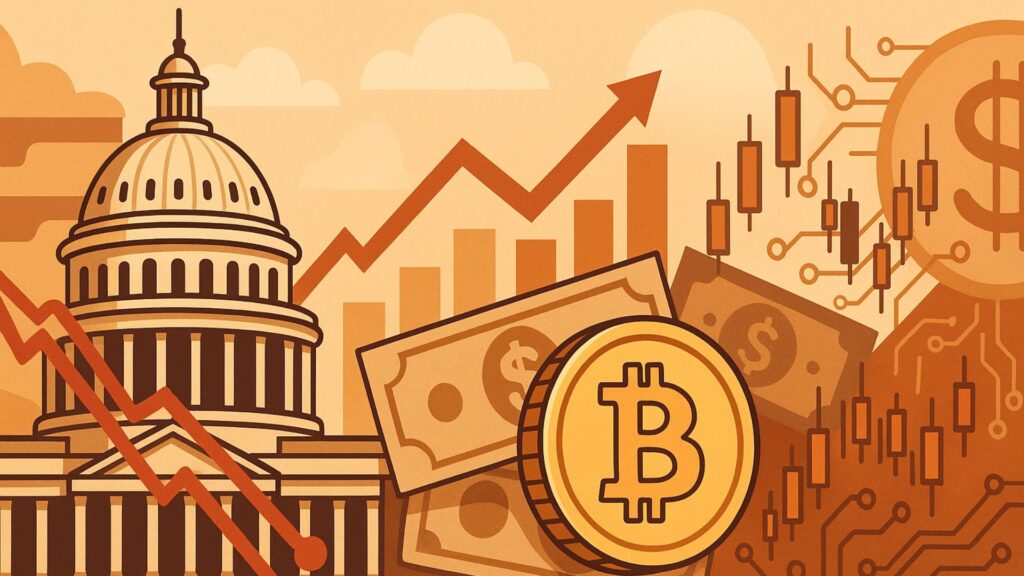The United States entered a government shutdown on October 1, 2025, after Congress failed to agree on a new spending bill. This political deadlock has already halted many federal services and left millions of workers in uncertainty.
At the same time, it created ripple effects across financial markets worldwide. In this situation, digital assets such as Bitcoin appear to respond differently, offering investors both challenges and opportunities.
This article will explain the meaning of the government shutdown, its immediate consequences, and how it could influence the cryptocurrency market.
What is the Government Shutdown?
A government shutdown in the United States happens when Congress does not pass funding legislation for federal agencies before the beginning of a new fiscal year.
Without this funding, non-essential services stop, and federal employees either work without pay or are placed on unpaid leave.
Essential functions such as border protection, air traffic control, and in-hospital medical care continue but under limited conditions.
The most recent shutdown began on October 1st, 2025. The dispute centred on disagreements between Republicans, led by President Donald Trump, and Democrats over healthcare spending.
Republicans aimed to reduce subsidies and scale back Medicaid funding, while Democrats demanded continued support for Affordable Care Act programmes and opposed budget cuts to agencies such as the Centres for Disease Control and the National Institutes of Health.
Attempts at compromise failed in the final days of September, and two versions of funding bills collapsed in the Senate.
The image that circulated online showing House Democrats filling their seats while the Republican side appeared empty became symbolic of the divide.
It illustrated the lack of consensus and the visible split between the two parties, with each blaming the other for the failure to keep the government operating.
The effects of the shutdown are far-reaching. Up to 4 million federal employees are affected, including two million active duty military personnel and members of the National Guard. Many of them are required to continue working without pay until new funding is approved.
Non-essential services such as national parks, museums, student loan processing, and food inspection programmes face suspension.
Families relying on federal aid programmes such as Women, Infants, and Children risk losing access to basic support if the shutdown extends for weeks.
The economic impact is also significant. Analysts estimate that every week of shutdown can reduce US economic growth by between 0.1% and 0.2%. During the 2018–2019 shutdown, about 3 billion dollars of lost output was never recovered.
The 2025 situation is already seen as potentially more damaging because of the threat of permanent staff cuts. President Trump has even suggested that a shutdown could help identify non-essential workers who might later be dismissed permanently.
Shutdowns are not new in the United States. Since the 1980s, there have been several instances, including the record 35-day shutdown in 2018.
However, this one comes at a time when the global economy is fragile, and financial markets are highly sensitive to any political instability. As such, the 2025 shutdown is not only a domestic issue but also a global concern.
How Does It Impact Crypto?
The government shutdown affects the financial system in several ways. First, it disrupts the release of key economic data, such as employment and inflation reports. Without these indicators, investors and policymakers lack reliable information to guide decisions.
The absence of data increases uncertainty and may push central banks like the Federal Reserve to adopt more accommodative policies, including keeping interest rates lower for longer.
Second, a shutdown reduces confidence in traditional financial structures. Government debt remains safe in theory, but when operations are halted and millions of workers go unpaid, questions about fiscal management become louder.
This erodes trust in the dollar as the world’s primary reserve currency, even if only temporarily. In such circumstances, alternative assets such as gold and Bitcoin often attract attention because they are not tied directly to government budgets or political decisions.
Third, liquidity conditions change. Shutdowns typically lead to delayed spending by the federal government, which can slow down the circulation of money in the economy.
To offset these effects, the central bank may increase liquidity through rate cuts or slower tightening of its balance sheet. Expanded liquidity tends to benefit risk assets, including stocks and digital currencies.
For crypto, this means that macroeconomic events rooted in politics can indirectly create a more favourable environment for adoption and investment.
The connection between government shutdowns and crypto lies in the perception of independence. Cryptocurrencies such as Bitcoin operate outside the authority of any single government.
When the most powerful government in the world demonstrates instability, some investors see digital assets as a hedge against political dysfunction.
This does not mean crypto is immune to volatility, but it does highlight how its value proposition grows more visible in times of systemic stress.
The 2025 shutdown also highlights how institutions react. Large firms like Metaplanet in Japan continue to allocate capital into Bitcoin despite turbulence in global markets. Their moves reflect a long-term belief that digital assets are a store of value when traditional systems falter.
In this way, government shutdowns reinforce the narrative that crypto is not just a speculative tool but also a safeguard against financial uncertainty.
Conclusion
The 2025 United States government shutdown reveals the fragility of political negotiations and the wide impact they can have on both citizens and the economy. Millions of workers face uncertainty, public services are disrupted, and economic growth is at risk.
Yet this political paralysis also highlights the growing role of crypto. By operating independently of governments, Bitcoin and other digital assets present themselves as alternatives when traditional structures appear unstable.
The shutdown demonstrates the correlation between fiscal policy failures and renewed interest in decentralised assets. It shows how events in Washington can ripple through financial markets and ultimately strengthen the case for crypto in the broader global economy.

